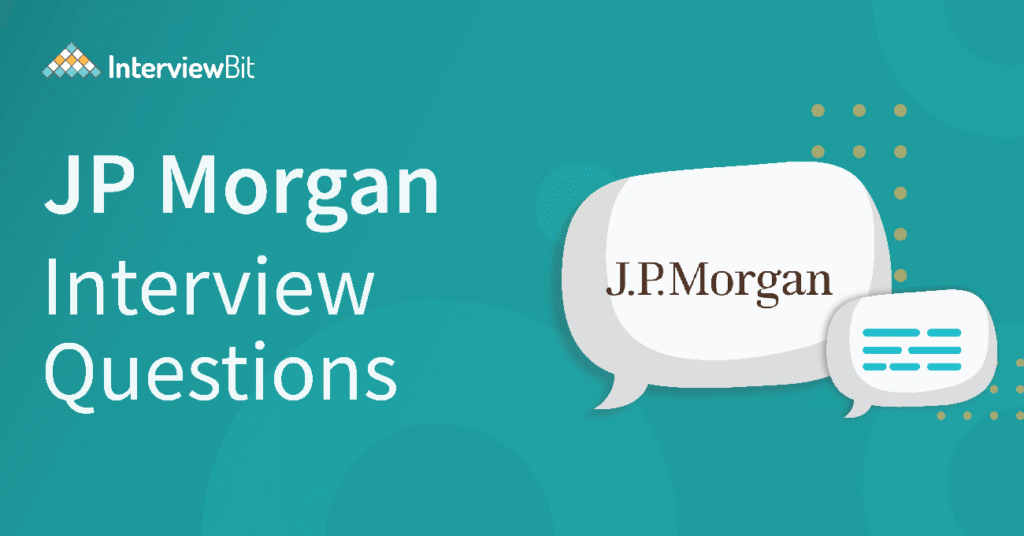Now Reading: JP Morgan Interview Success Guide: Real Questions & Winning Answers
-
01
JP Morgan Interview Success Guide: Real Questions & Winning Answers
JP Morgan Interview Success Guide: Real Questions & Winning Answers

JP Morgan leads the pack as America’s biggest bank and ranks as the world’s most valuable bank by market capitalization in 2023. The financial powerhouse generates $177.6 billion in revenue and employs more than 317,233 people worldwide. A career at this banking giant attracts fierce competition.
Getting ready for JP Morgan jobs needs careful planning and practice. You might be learning about JP Morgan Chase careers, looking at entry-level positions, or hoping to land a JP Morgan internship. This piece will give you the real interview questions and answers that work. On top of that, you’ll get insider tips to help you shine among thousands of candidates who want to join this 200+ year-old institution. The company’s move to its new 1,388-foot headquarters in 2025 makes this the perfect time to prepare for their hiring process.
Understanding the JPMorgan Interview Process

Image Source: Chase Bank
JP Morgan’s interview process takes about 4 weeks to 2 months, depending on the role and timing. The process is comprehensive and aims to identify the best talent.
JP Morgan’s interview process has four main stages:
- Application and Resume Review – Your opportunity starts through JP Morgan’s website, career fairs, or direct recruiter contact. Your first impression plays a key role, so customize your resume to showcase skills and experiences that match your desired position.
- Pymetrics Assessment – After the screening, you will take a 30-minute online Pymetrics test to measure your cognitive, social, and behavioral traits. This game-based assessment helps JP Morgan understand your thinking patterns beyond your resume.
- HireVue Video Interview – The next step is a 20-minute pre-recorded video interview with 3-5 questions. You get time to prepare before each response. Questions focus on behavioral scenarios rather than technical knowledge.
- Final Rounds/Super Day – The process concludes with multiple interviews on a single day. Investment banking candidates meet 3-6 bankers over several hours during the “Super Day.” Technical positions include coding challenges, while other roles have 1-4 interviews based on the department.
JP Morgan looks at both technical abilities and cultural alignment. Candidates who succeed often connect well with interviewers and ask insightful questions that show real interest.
Each department has its own approach. Investment banking follows standard procedures, while technology roles add specific technical tests. Understanding these differences helps you prepare better for your JP Morgan interview.
Common JPMorgan Interview Questions and How to Answer Them

Image Source: Management Consulted
Your success in JP Morgan interviews depends on how well you answer different types of questions. The company’s interview reports show that some questions come up more often than others, regardless of the position.
JP Morgan’s interview process relies heavily on behavioral questions. These questions show up in HireVue and final rounds. The data shows something interesting – just five questions make up over 60% of all behavioral questions. “Why JP Morgan?” tops the list and makes up 32% of all behavioral questions that candidates report.
Here are the most common behavioral questions:
- “Why JP Morgan?” (Show you’ve researched their culture and values.)
- “Why do you want to work in financial services?” (Demonstrate genuine interest beyond salary.)
- “Tell me about yourself.” (Concise professional story)
- “Describe a time you worked in a team” (Highlight collaboration skills)
- “Tell me about a challenging project you managed” (Showcase problem-solving abilities)
Technical roles need you to prove your domain expertise. Software engineers might get coding challenges like “Group anagrams” or “Find the maximum subarray sum”. Finance candidates should know their DCFs, valuation methods, and accounting principles well.
The STAR method works best to answer situational questions: Situation, Task, Action, Result. Many candidates find it hard to tell the difference between task and action steps. A better way uses five parts: situation context, problem definition, solution approach, implementation details about your role, and measurable results with lessons learned.
Being genuine matters more than perfect answers in your JP Morgan interview. Pick a real but fixable weakness when they ask about it. One candidate did this well: “I once managed a project with an unrealistic timeline because I was excited about it. Since then, I always analyze projects thoroughly before committing to deadlines.”
JP Morgan looks for candidates who can think analytically, work in teams, show drive, and present well. These skills are the foundations of success in today’s digital world of finance.
How to Prepare and Stand Out as a Candidate

Image Source: InterviewBit
Success at a JP Morgan interview needs solid preparation that goes beyond researching common questions. Your journey starts with a resume that grabs the recruiter’s attention.
Tailor your resume meticulously to match each JP Morgan position you want. Use specific numbers to showcase your achievements. Add examples of leadership and teamwork that match the company’s collaborative culture. Students should highlight relevant courses, internships, and projects. A concise resume works best since you’ll get a chance to explain more during interviews.
Research extensively about your target role. Learn about the specific division you’re interested in, not just general company facts. This shows your drive and knowledge of JP Morgan’s work. Meeting JP Morgan representatives at career fairs or events helps create connections. Mention these meetings in your application to stand out.
Practice interview scenarios well. Record your answers and watch them to spot areas you need to improve. While practicing alone helps, mock interviews reveal blind spots you might miss. The STAR method helps with behavioral questions, but try to clearly separate the problem from your actions.
Get your interview space ready carefully. Test your tech setup ahead of time for virtual interviews to avoid problems. Pick a quiet spot where no one will disturb you. Wear business formal clothes whatever the interview format.
Show real interest as you talk. Ask specific questions about JP Morgan that prove you’ve done your homework. Keep up with company news to speak with confidence.
Remember to send a thank-you note after your interview to show you’re excited about the chance to join. This professional touch reinforces your interest in JP Morgan’s supportive culture, where growth happens naturally.
A well-planned approach to these areas will substantially boost your chances to shine among other JP Morgan candidates.
Conclusion
Getting a job at JP Morgan takes commitment, solid preparation, and confidence during interviews. This piece walks you through the detailed four-stage interview process that candidates need to complete – from the original resume screening to the final Super Day. A good grasp of both behavioral and technical questions gives you a big advantage.
Your preparation can set you apart from thousands of other qualified candidates. Data shows candidates who really understand JP Morgan’s culture, practice their answers, and come ready with smart questions perform better by a lot. The advanced STAR method helps you answer situational questions while showing off your analytical thinking and problem-solving skills.
Being genuine matters more than being perfect. JP Morgan looks for people who fit their shared culture and bring fresh views to their teams. Show your real strengths and be open about areas where you can grow.
The interview process might look tough at first. The strategies in this piece help you tackle each stage confidently – from customizing your resume to setting up your interview space. Your careful preparation will highlight what JP Morgan values most: analytical thinking, teamwork, motivation, and strong presentation abilities.
A chance to join this 200-year-old global powerhouse awaits those ready to work hard. Your path to a JP Morgan career begins now – one well-prepared interview at a time.
FAQs
Q1. What are the stages of JP Morgan’s interview process? JP Morgan typically has a four-stage interview process: application and resume screening, online assessments (including Pymetrics), a HireVue video interview, and final rounds or Super Day interviews. The entire process can take 4-8 weeks depending on the role.
Q2. How difficult are JP Morgan interviews? JP Morgan interviews are considered moderately challenging. They assess both technical skills and cultural fit. Candidates rate the interview difficulty as 2.94 out of 5, with a 61.6% positive experience rate. Thorough preparation is key to success.
Q3. What types of questions does JP Morgan ask in interviews? JP Morgan asks a mix of behavioral, technical, and situational questions. Common behavioral questions include “Why JP Morgan?” and “Tell me about a challenging project.” Technical questions vary by role but may include coding challenges or finance concepts. They also use case studies to assess problem-solving skills.
Q4. How can I prepare for a JP Morgan interview? To prepare, research the company thoroughly, practice common interview questions, use the STAR method for behavioral questions, and prepare relevant examples of your skills and experiences. Also, stay updated on financial news, especially related to JP Morgan, and prepare thoughtful questions to ask your interviewers.
Q5. What does JP Morgan look for in candidates? JP Morgan seeks candidates who demonstrate analytical thinking, teamwork capabilities, drive, and strong presentation skills. They value authenticity, cultural fit, and a genuine interest in the financial services industry. Showing how you align with their collaborative culture while bringing unique perspectives can help you stand out.



